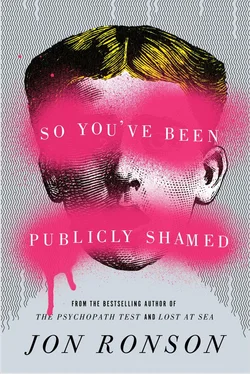Jonah had a house in the Hollywood Hills and a wife who loved him. He had enough self-esteem to get him through. But I think that in front of the giant Twitter screen he felt for an instant that same deadness that Gilligan’s prisoners had described. I have felt it too. I know exactly what Jonah and Gilligan meant when they talked about shutting down — that moment pain turns to numbness.
• • •
James Gilligan has led a distinguished life. President Clinton and UN Secretary-General Kofi Annan appointed him to sit on advisory committees on the causes of violence. Martin Scorsese based Ben Kingsley’s character in Shutter Island on him. But for all his accolades, I left Gilligan’s apartment thinking that he hadn’t considered his life’s work a success. There was a time when he might have totally changed the way the United States treated its transgressors. But it didn’t happen.
This is the reason why: Throughout the 1980s, Gilligan ran experimental therapeutic communities inside Massachusetts’s prisons. They weren’t especially radical. They were just about “treating the prisoners with respect,” Gilligan told me, “giving people a chance to express their grievances and hopes and wishes and fears.” The point was to create an ambience that eradicated shame entirely. “We had one psychiatrist who referred to the inmates as scum. I told him I never wanted to see his face again. It was not only antitherapeutic for the patients, it was dangerous for us.” At first, the prison officers had been suspicious, “but eventually some of them began to envy the prisoners,” Gilligan said. “Many of them also needed some psychiatric help. These were poorly paid guys, poorly educated. We arranged to get some of them into psychiatric treatment. So they became less insulting and domineering. And violence dropped astoundingly.”
Even apparently hopeless cases were transformed, Gilligan said. Even that pimp from Boston. “After he joined our program, he discovered a profoundly retarded eighteen-year-old young man. The boy could hardly tie his shoelaces. So he took care of him. He started protecting him. He’d take him to and from the dining hall. He made sure other inmates didn’t harm him. I was, ‘Thank God. This could be this guy’s road back to humanity.’ I told the staff, ‘Leave this alone.’ Their relationship built and matured. And he has a life now. He has not harmed a hair on anybody’s head in twenty-five years. He acts like a normal human being. He’s not going anywhere. He’s not normal enough to ever go back to the community. But he wouldn’t want to. He knows he couldn’t make it. He doesn’t have the psychological wherewithal, the self-control. But he has reclaimed a level of humanity that I never thought was possible. He works in the prison mental hospital. He’s useful to other people. And when I go back to visit, he smiles and says, ‘Hello, Dr. Gilligan. How are you?’” Gilligan paused. “I could tell you a hundred stories like that. We’d had men who had blinded themselves by banging their heads against the wall.”
—
In 1991, Gilligan began co-opting Harvard lecturers to donate their time to teach classes inside his prisons. What could be more deshaming than an educational program? His plan coincided with the election of a new governor, William Weld. Weld was asked about Gilligan’s initiative in one of his first press conferences. “He said, ‘We have to stop this idea of giving free college education to inmates,’” Gilligan told me, “‘otherwise people who are too poor to go to college are going to start committing crimes so they can get sent to prison for a free education.’”
And so that was the end of the education program.
“He literally decimated it,” Gilligan said. “He stripped it. I didn’t want to preside over a sham.” And so Gilligan quit.
As the years passed, he became for prison reformers a figure of nostalgia. Only a handful of therapeutic communities inspired by his Massachusetts ones exist in American prisons today. But, as it happens, one of them is situated on the top floor of the Hudson County Correctional Center in Kearny, New Jersey. And it is being quietly run by the former New Jersey governor Jim McGreevey.
• • •
The nontherapeutic lower floors of the Hudson County Correctional Center are drab and brown — like the ugly parts of a municipal leisure complex, a long corridor from a changing room to a swimming pool that will never be there. Down here is where New Jersey keeps its suspected immigration offenders. In November 2012 it was declared one of the ten worst immigration detention facilities in America, according to a Detention Watch Network report. Some of the guards down here reportedly called the detainees “animals,” and laughed at them, and subjected them to unnecessary strip searches. The report added: “Many immigrants also noted that corrections officers appeared to bring their personal problems to work, taking their frustration and anger out on them.”
—
“EVERY DAY IS A BLESSED DAY!” Jim hollered at a suspected immigration offender who was mopping the floor. The man looked startled. He smiled uneasily.
We kept walking — past inmates just sitting there, looking at walls. “Normal prison is punishment in the worst sense,” Jim told me. “It’s like a soul-bleeding. Day in, day out, people find themselves doing virtually nothing in a very negative environment.”
I thought of Lindsey Stone, just sitting at her kitchen table for almost a year, staring at the online shamings of people just like her.
“People move away from themselves,” Jim said. “Inmates tell me time and again that they feel themselves shutting down, building a wall.”
Jim and I walked into an elevator. An inmate was already in there. Everyone was quiet.
“Every day is a blessed day,” said Jim.
More silence.
“Watch your character! It becomes your destiny!” said Jim.
We reached the top floor. The doors opened.
“You go first,” said Jim.
“Oh, no, please, you,” said the inmate.
“No, you,” said Jim.
“Oh, no, you,” said the inmate.
We all stood there. The inmate went first. Jim gave me a happy smile.
The first time I’d met Jim — when he’d yelled “STUDY HARD AT MATH!” at a startled stranger child — I’d found him a bit nuts. But somewhere along the line he’d become heroic to me. I’d been thinking about a message that had appeared on the giant Twitter feed behind Jonah’s head: “He is tainted as a writer forever.” And a tweet directed at Justine Sacco: “Your tweet lives on forever.” The word forever had been coming up a lot during my two years among the publicly shamed. Jonah and Justine and people like them were being told, “No. There is no door. There is no way back in. We don’t offer any forgiveness.” But we know that people are complicated and have a mixture of flaws and talents and sins. So why do we pretend that we don’t?
Amid all the agony, Jim McGreevey was trying an extraordinary thing.
—
In front of us was a giant locked dormitory room. Inside were forty women. This was Jim’s therapeutic unit. We waited for someone to let us in. It wasn’t like downstairs, Jim said; his women were “up at eight-thirty a.m. They all have chores. Everybody works. They’re all assigned physical tasks. Then there are workshops — on sex abuse, domestic violence, anger management — then lunch, then in the afternoon they focus in on job training, housing. There are books. There’s cake. There’s the library. Then the mothers can read bedtime nursery rhymes to their children over Skype.”
There were glimpses of a summer day through the windows, and as a corrections officer let us in, she said that tensions were high because warm days are when a person really feels incarcerated.
Читать дальше












